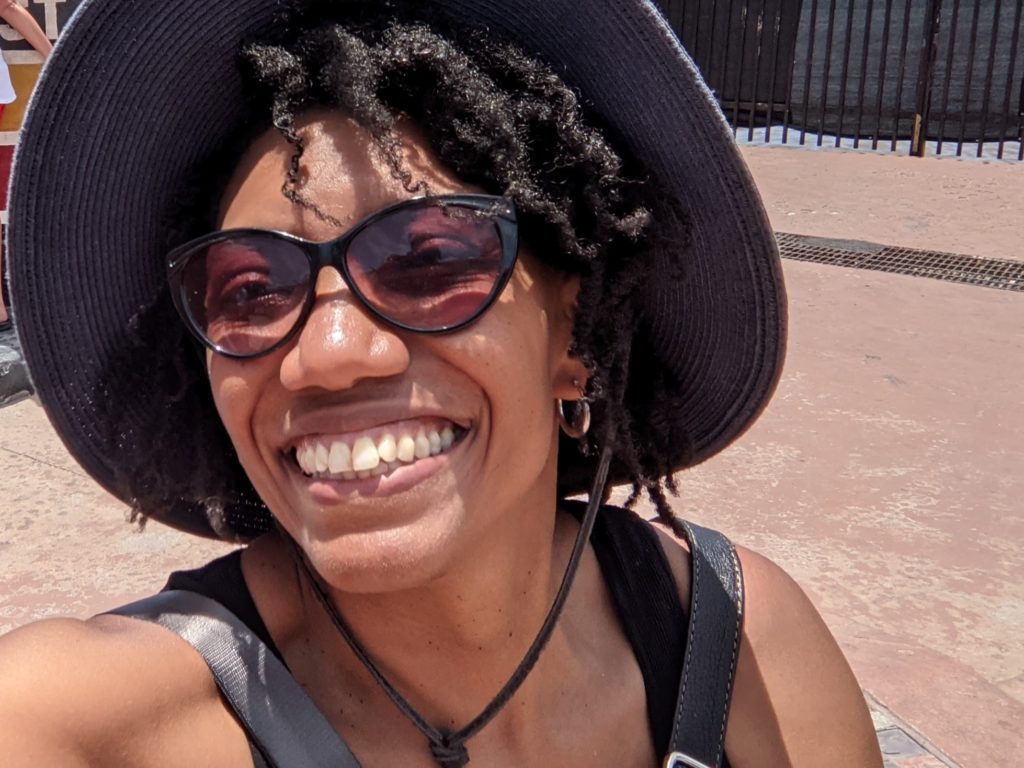
Joylette Portlock has been getting mammograms for years. Before her mother passed away of metastatic breast cancer at the age of 48, Joylette promised her she would keep up with her screenings. Last year, Joylette participated in Dr. Wendie Berg’s PBCC-funded clinical trial using contrast-enhanced mammograms in addition to 3D mammograms. The 3D mammogram didn’t find her cancer, but the contrast-enhanced mammogram did. Here is Joylette’s Survivor Spotlight story in her own words…

In May of last year, one of my surgeons, pre-op, noted that I didn’t seem to have any underlying conditions or past injuries that they needed to worry about. I said, “It’s true! I’m extremely healthy… except I have cancer!”
Let me back up. Because to explain What Cancer Means to Me requires additional context.
Cancer is grief and fear. When my mother found the lump in her breast that her mammograms had dismissed, she was the same age I was when I was diagnosed. Jacqueline Portlock was a kindergarten teacher, in the way that some people have of finding the profession that embodies their predilections. She was kind and supportive and so, so silly. She taught me how to see the world – when other people complained of bad weather, she would smile and say, “this is a perfect rainy day!” She taught me to teach, and she taught me to love. I am so lucky to have had her for 21 years. The world is unlucky to have only had her for 48.
Because of my mother, I have gotten mammograms annually since I was 33. Because of my mother, I’m eligible for two breast exams a year, one with the high risk breast cancer center at UPMC. And because of my last visit there, I learned of an imaging study run by Dr. Wendie Berg based out of Magee Women’s Hospital for women with dense breast tissue and a family history of breast cancer. In the study, a standard mammogram showed nothing out of the ordinary, and gave me a clean bill of health to come back for my usual annual screen. The contrast enhanced picture showed a small but clear glowing spot. The radiologist said I needed to come back for more imaging.
Cancer is luck. Bad luck to get it, and in my case very, very, unbelievably good luck to be in an area where it was possible to catch the tumor while it was still very small and unlikely to have spread. Dr. Berg’s study saved my life.
I avoided chemo, another thing to be grateful for; but I underwent radiation therapy, aka the process of slow-motion barbecuing one of the body’s most sensitive parts across a month of weekly hospital treatments. It’s a lot. There is fortitude alongside helplessness. Early stage cancer is still cancer. You still have to tell your kids “I have cancer. Yes, the same illness that killed the grandmother you never met.”
After radiation, my hormone therapy regimen brought joint pain and hot flashes and grappling with the sudden end of the life stage I’d been in since middle school, and everything that means, physically and emotionally. Including regular injections, and daily medication and NSAIDs for the joint pain and vitamin supplements to hopefully stave off osteoporosis. I feel the effects of this part of my cancer treatment all day every day. And I will continue to do so for years to come. Cancer is finding peace with knowing you have limited control. With recurrence now always a risk, I choose peace over the sword of Damocles, actively, every day. I know how lucky I am to hear the words “your prognosis is good” from my oncologist.
I haven’t talked about my diagnosis widely before. I’ve been lucky, again, to have a choice. Cancer holds the terrible potential to reduce everything in your life to being about your terrible disease, which is one of the toughest pills to swallow when you’ve spent your lifetime so far refusing to fit into boxes. It’s been a difficult, emotional journey, and I have spent a lot of time feeling everything at once. In a battle for your life when you are not allowed to declare victory, Survivor does not seem to capture all the things I am in the wake of my diagnosis. There is strength in declaring myself Resilient.
I am sharing now, for those whose life experience mirrors mine in some way, to make it clear that no matter how isolated you feel on your path, you are seen, too. And it is worth the cost in bravery to give a face and a voice to the importance of regular screenings and improved imaging.
Cancer, for me, is heartbreak and trauma and peace and fear and gratitude. A reminder to always, always live like you’re dying.*
